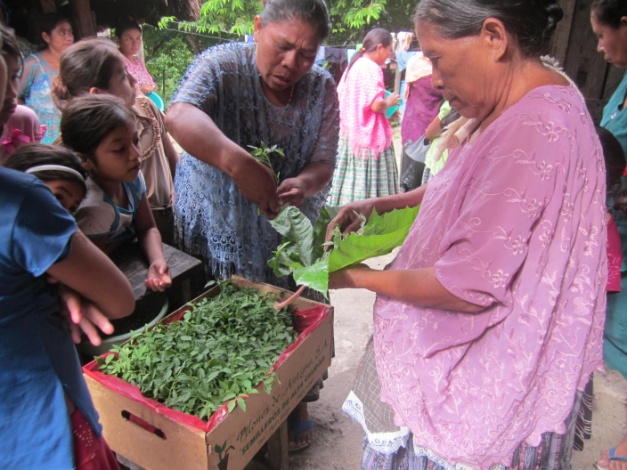(GUATEMALA) In Baja Verapaz, Guatemala, there is a small community called Cabulco where every inhabitant is from an indigenous background and lives by the customs they have been taught since childhood. Micaela López Teletor, now 47 years old, is a lifelong resident of Cabulco who is from the Maya Achi ethnic group. Micaela remembers growing up in a poor household with few resources.
 As the only daughter in her family Micaela learned that according to Maya Achi tradition, her place was at home helping her mother with the household chores. The few opportunities for education available to her family were only for her brothers because her parents believed that the men need to be educated to provide for the family. As a result, Micaela never attended school or learned to read or write.
As the only daughter in her family Micaela learned that according to Maya Achi tradition, her place was at home helping her mother with the household chores. The few opportunities for education available to her family were only for her brothers because her parents believed that the men need to be educated to provide for the family. As a result, Micaela never attended school or learned to read or write.According to Maya Achi tradition, girls are given in marriage as young teenagers, and that was exactly what happened to Micaela. She was 12 years old when she was given in marriage to a man from the community named Domingo Álvarez. The couple had two children, a boy and a girl, who were both were born with hearing and speech disabilities. The family lived in very poor conditions Cabulco: they had no land to grow food, and their opportunities to make a living were few. Looking for better living conditions, Micaela and her husband decided to move to Petén.
Petén is the largest region in Guatemala. It borders both Mexico and Belize. Thirty years ago, this region was mostly tropical jungle, and to promote its development in the 1980s, the Guatemalan government allowed people to colonize it, giving away land to anyone who would cultivate it. Petén was the “homestead” of Guatemala. Today, families still migrate to Petén to find a better life.
When Micaela and her family arrived at Petén in 2002, they settled in Valle Nuevo where they bought some inexpensive land. Despite this development, their lives were not much better than they were in Cabulco. Valle Nuevo is isolated and the soil was poor, making it difcult for them to grow food or earn income to support their family.
One day, Micaela met with a health promoter from APIDEC (Asociación Civil Programa Integral de Desarrollo Cristiano), a local partner of World Renew, who invited her to participate in workshops and trainings in health and agriculture. Micaela and Domingo learned a lot there, and they started to implement the new techniques they were taught. They built a home garden and began growing peppers, tomatoes, and medicinal plants for their own consumption and to sell in the local market.
When they harvested and sold their produce, they were able to purchase materials to repair and improve their house. As their children grew, they too became involved with APIDEC’s programs.
“The best thing that could have happened to us in life is to know about God through the gospel and the people of APIDEC,” Micaela said. “They taught us to raise a home garden where we are growing crops to eat and sell. We have radically changed our lives because we know that the APIDEC staff will treat us with love and respect.
“My family and I are really happy to live in a community that is improving because of its hard work. Now, our community is less isolated because a road has been built to it. During the last few years, we have also established schools, hired teachers, built health centers that provide care for our children, and set up a licensed cemetery. These are changes that we have achieved and that we will all benefit from. We hope to continue growing as families and together as community.”
Micaela’s life changed completely. She and her family feel blessed and are grateful to God, and World Renew and its partner, APIDEC.
Blessings,
Sadoc Aguilar Palma
Program Consultant
